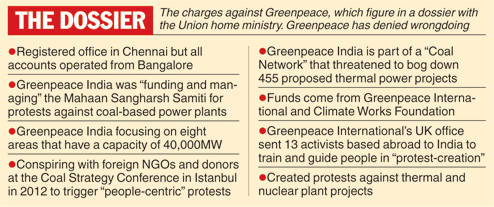
New Delhi, April 9: The Union government today barred Greenpeace India from receiving foreign funds for six months and froze its bank accounts, alleging that the environmental group that has been campaigning on air energy and food issues had hurt India's public and economic interests.
The home ministry said Greenpeace India had "prejudicially affected" India's public and economic interests "in violation" of the Foreign Contribution Regulation Act.
The ministry froze seven bank accounts of the organisation. Five of these had not been declared to the government, ministry sources said.
In a dossier prepared after an investigation that lasted six months, the home ministry has alleged that Greenpeace has violated FCRA rules, campaigned against coal projects in India, attempted to portray Indian tea as laced with pesticides and tried to influence government policies.
Greenpeace activists have labelled the government's allegations a "smear campaign", and claimed that the home ministry's moves are intended to silence "voices of dissent" by using the non-government environmental organisation to set an example.
Over the past decade, Greenpeace activists in India have campaigned against genetically modified crops and raised concerns about India's dependence on coal and nuclear energy, saying that continued pursuit of coal would threaten forests and air quality, and that nuclear energy is not economically viable.
Government sources said that FCRA violations and government show-cause notices for cancellation of licence were not uncommon but the scale in case of Greenpeace was bigger than that for many others.
The home ministry had a few years ago cancelled the FCRA licence of the Catholic Organisation for Relief and Development Aid, a Dutch non-government organisation, for violations.
Security agencies have alleged that about 200 foreign donors have indulged in money-laundering under the cover of funding social causes in India.
The home ministry sources said Greenpeace had received Rs 53 crore over the past eight years and spent Rs 45 crore or nearly 85 per cent on salaries and advertisements in breach of FCRA rules that allow a maximum of 50 per cent.
"Significant amounts were deposited in different layers of accounts and spent in cash," a ministry source claimed.
In its notice to Greenpeace, the ministry said it had found that the organisation had also under-reported, and mentioned incorrect amounts of, the foreign funds received, in violation of the FCRA.
The ministry said the most glaring example of the irregularities was an auditors' certificate that stated that Greenpeace's foreign funds opening balance for 2008-09 was "NIL", while the actual balance was Rs 6.6 crore.
Greenpeace has dubbed this a typographical error but the ministry has said this is "not tenable".
The dossier said Greenpeace, in contravention of FCRA rules, had been in talks with the Aam Aadmi Party and had declared the NGO's consultant Pankaj Singh as the AAP candidate for the Sidhi Lok Sabha constituency in Madhya Pradesh. Singh subsequently resigned from Greenpeace but the latest information indicates he is again active in Greenpeace campaigns in Madhya Pradesh, the home ministry document said.
Security agencies suspect Greenpeace has used its funds to support protests against development projects in Singrauli, Madhya Pradesh. In January this year, Priya Pillai, a Greenpeace activist, was offloaded from a flight to London where she was to speak on coal mining in Singrauli.
The home ministry said intelligence reports had indicated that Pillai was planning to testify on the allegedly poor state of tribal people in India and the manner in which the government was trying to "rob" them of their rights which, the ministry said, was "an absolutely false allegation".
Delhi High Court has questioned the home ministry's decision to prevent Pillai from travelling to London. But the security establishment continues to harbour suspicions that the activists are trying to block development projects in India.
"When one sees no service delivery like education or environment, then one assumes that most of the funds from foreign donors go towards advocacy, which is unfair," a government source said.
The home ministry said Greenpeace India had released a report titled "Trouble Brewing on Indian Tea", claiming that it had detected pesticides in Indian tea brands that are exported to Europe and North America, without releasing the forensic analysis of the findings.
A private European laboratory had analysed the tea. The Tea Board of India disagreed with the findings, and views the report as an attempt to impact Indian tea exports, the ministry said, describing Greenpeace's campaign as similar to a drive against Chinese tea companies.
The home ministry has sent a notice to the group, saying its FCRA licence will be cancelled permanently if it fails to make a satisfactory presentation to the government.
Greenpeace said it planned to challenge the home ministry's move to block its foreign funds and claimed the government had been waging a "defamation campaign" against the environmental organisation.
"This is a smear campaign - the government wants to crush voices of dissent. It wants to send a signal to others using Greenpeace to set an example," Vinuta Gopal, climate and energy campaign manager with Greenpeace, told The Telegraph.
In a statement issued earlier this week, Greenpeace had said that for the financial year ending on March 31, 2015, the organisation had received more funds from "sources within India" than from foreign sources. It said it had received Rs 20.76 crore from supporters within India and Rs 9.6 crore from foreign donations, largely from Greenpeace International and Bertha Foundation, another non-government entity that says it "supports forms of activism that aim to bring about change".
Greenpeace has said it does not accept money from corporations or government entities.
"Even as the home ministry smears us as 'anti-national', it is heartening to know that thousands of Indians reject their view and are voicing their disagreement with their wallets," Samit Aich, the executive director of Greenpeace India, said in the statement.










